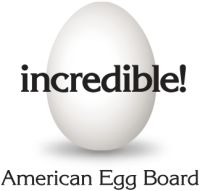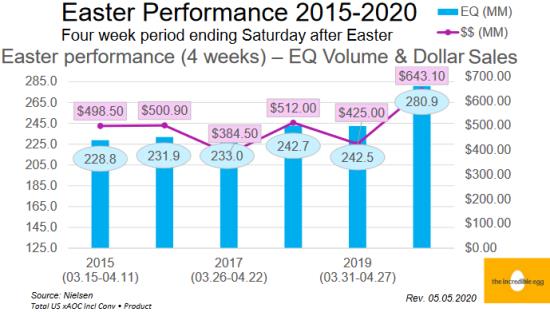Nielsen Retail Data Distributed by AEB
|
06/03/2020 |
|
 The American Egg Board publishes data acquired from Nielsen, reflecting retail volume and value of eggs and products sold at retail. The data covered in this review reflects 2020 through April 18th presented as either year-to-date or the past 52-weeks as indicated. The American Egg Board publishes data acquired from Nielsen, reflecting retail volume and value of eggs and products sold at retail. The data covered in this review reflects 2020 through April 18th presented as either year-to-date or the past 52-weeks as indicated.
Conclusions from the April data are summarised:-

- For 2020 year-to-date, sales of fresh retail eggs expressed in equivalent dozens increased by 10.7 percent over the corresponding period in 2019. Value increased by 16.0 percent. The increases were attributed to the March spike in demand and pricing due to COVID-19 related panic buying.
- The USDA projects per capita consumption in calendar 2020 to attain 294.7 eggs, a 0.6 percent increase over 2019.
- For the past 52-weeks, shell egg sales attained 3.056 billion dozen, a 4.6 percent increase over the corresponding period in 2019. Value decreased by 3.5 percent to $5.454 billion, representing a unit price of $1.78 per dozen. Egg products at retail including liquid, frozen or powdered real-egg represented the equivalent of 83.5 million dozen, a one percent decline. Egg product sales were valued at $276 million or a 0.5 percent decline over 2019. The egg equivalent unit price for egg products was $3.30 generating positive margins for further processing. Egg products represented 2.6 percent of eggs sold expressed on an egg equivalent basis but comprised 12.4 percent of value.
 - A total of 31.2 million egg equivalent dozens were sold as hard boiled, a decline of 1.9 percent in volume over 2019. Value was $158.3 million, a decline of 1.5 percent compared to 2019. Hard boiled eggs represented slightly less than one percent of volume but 2.7 percent of total value, again denoting the benefit of further processing.
- Sales of egg equivalents for the four weeks over the Easter period, ending the Saturday after the Easter weekend, attained 242.5 million dozen in 2019 valued at $425 million corresponding to a unit price of $1.76 per dozen. In contrast for the four-week period in 2020, 280.9 million dozen were sold at a value of $643.1 million or unit price of $2.29 per dozen equivalent to a 30.1 percent increase in unit price over the four-week Easter period during the previous year.
- For the past 52-week period, generic shell eggs represented 86.9 percent of sales, a 9.6 percent increase over 2019 but a 15.4 percent increase in value. Cage free eggs represented 10.6 percent of the retail market growing by 17.5 percent in volume and 16.3 percent in value, confirming a reduction in perceived value for this category. Certified organic eggs represented 2.4 percent of total egg sales, increasing by 21.9 percent in volume and 23.5 percent in value over 2019.
- In comparing branded and private label categories, sales of branded eggs represented 28.4 percent of sales, an increase of 10.9 percent over the 52 week period. Private label represented 71.6 percent of sales, an increase of 10.6 percent. In comparing value, branded eggs comprised 40.6 percent of sales an increase of 19.1 percent. In contrast, private label value represented 59.4 percent of total shell egg sales and grew at 14 percent. The fact that branded eggs increased in volume to 28.4 percent of the market but attained 40.6 percent of dollar value. This suggests that private label eggs are now regarded by consumers as a commodity. This reality is due to the fact that one nationally marketed brand dominates the category with extensive marketing and the unique attribute of product differentiation through nutrient enrichment. A branded egg, that fails to offer a specific attribute over a generic private label egg is regarded as noncompetitive.

|
|
|